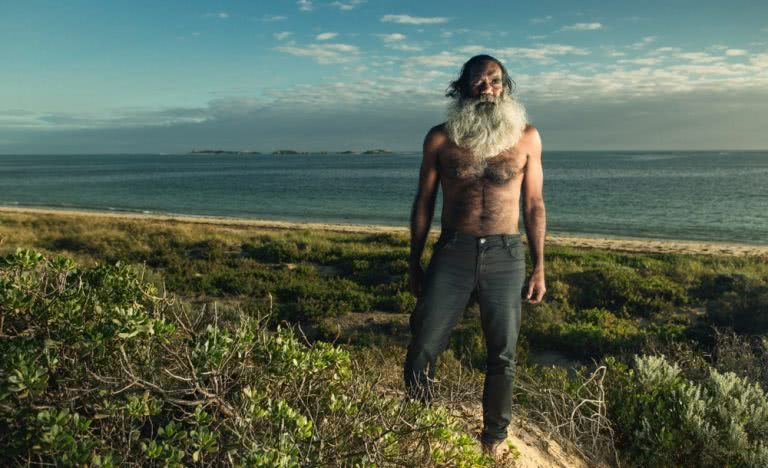For some, playwright Nathan Maynard’s description of his new work The Season as a “muttonbird story” might be a little confusing.
After all, the history and importance of the muttonbird – a dark-feathered species of shearwater mainly found around Tasmania and New Zealand – is yet to be comprehensively covered in mainstream channels, and the significant role the animal plays in the Aboriginal community isn’t widely known.
And yet, it is that very absence of understanding that Maynard’s work aims to combat. The Season takes its name from the window of time in which members of the Aboriginal community hunt the new generation of muttonbirds before they fledge, in the process seeking to connect not just to the land and nature but also with each other. To that end, Maynard’s work is deeply tied to the community it was written about and for.
“[The Season] is a Tassie story,” he says. “I don’t know about many other Aboriginal writers, but I can only assume for them too that the first people you write it for are your own community. When I first started writing it, I didn’t think in my wildest dreams that it would get to Sydney Festival. I just thought it might be a little play for a Tassie Aboriginal audience.”
The play focuses on the Duncans, a multi-generational indigenous family who have travelled to the Bass Strait’s Dog Island in order to take part in a muttonbird hunt. The Season juggles both thematic matters – the uneasy tension between the old and the new, the weight of tradition, the connection between people and place – and the lives and concerns of its characters. Maynard’s challenge quickly became about communicating a culture without ever losing sight of the actual people in the story.
“I knew what I wanted to say. I knew I wanted to tell a muttonbird story. I knew I wanted to tell a story about our connection to the muttonbird and our connection to each other. There’s a real culture down here, and a really unique culture. It was about trying to structure that into a clear narrative, into a clear story.
“There’s so much to say. There’s so many layers to a muttonbird story, particularly a family muttonbird story. Trying to get that into a story that gels and flows and is clear – that was difficult. But that’s where I got guidance off others, and dreaming – what I call dreaming. As much as you write, you’ve got to think about it as well. You dream about it during the day.”
Maynard’s process of dreaming about The Season has kept him busy since 2014, and allowed him to stay connected to the work even if he wasn’t explicitly sitting down to write it as often as he’d like to.
“It took about two years [to] write,” he says. “So it’s been a bit of a process. It was about trying to learn my craft. I’d like to be a full-time artist – I’m working towards it. But at that stage I was nowhere near it, so I had to juggle a nine-to-five job while doing all my own community commitments and writing. It wasn’t like I could just spend every day focusing on it. Even though it never leaves your mind, you can’t just sit in front of the computer and write every day.
“Some days [you’re thinking] about the plot, some days the characters,” Maynard adds. “Some days all of it. Sometimes you might get to a part where you’re like, ‘That character’s not strong enough. So what’s missing from that character’s journey?’ So I’ll sit there and I’ll dream it up. I’ll think about that story all day, or all week. And then I’ll go, ‘That’s what was missing.’”
The struggle was also very much one about communication. Maynard knew from the beginning that he would have to write The Season in a way that quickly explained the importance of muttonbirding to the wider community, but educating those with limited knowledge without irritating those in the know proved difficult.
“Sometimes I had to work on it at points where … I understood it, but didn’t know if the audience [would] understand it. I knew my community would understand it – I only have to say a couple of words and my community understand it. But as much as I started writing it for my community, I was always hoping the wider community would get to see it. I had to be really clear about what muttonbirding is. I had to think of the play like a person who had never even heard of muttonbirds before.”
The Season has already enjoyed a limited, well-received run around the country. Through the process of touring the play, Maynard has been able to effectively spread the story of muttonbirding, but he’s also learnt how little is known of the ritual, and how badly it needs to be cherished and nurtured.
“Most people in Tassie will have even a limited knowledge of [muttonbirding],” he says. “But I noticed when I went to Yarramundi with the play, the majority of the community up there didn’t have a clue,” he laughs. “Even the blackfellas up there didn’t have a clue!”
The Season is playing at the Sydney Opera House on Tuesday January 10 – Sunday January 15 as part of Sydney Festival.

































